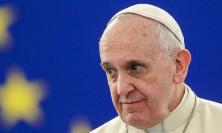In his addresses to an international theology conference in 1985, the then Fr Jorge Mario Bergoglio SJ echoed the invitation of Pope John Paul II to a ‘living and fertile symbiosis between faith and culture’. In this new translation of Fr Bergoglio’s words, we can explore his vision in which cultures become ‘the privileged space of mediation between the Gospel and humankind.’
The present article reproduces – in a form revised by the Holy Father – a broad portion of the inaugural and farewell addresses that the then Fr J.M. Bergoglio delivered to the participants of an International Conference of Theology, on the theme ‘The Evangelization of Culture and the Inculturation of the Gospel,’ prepared by himself and held at the Faculty of Theology of the Society of Jesus in San Miguel, Argentina, from September 2-6, 1985. The meeting was organized in order to celebrate the fourth centenary (1585-1985) of the arrival of the Jesuits in Argentina. It witnessed the participation of theologians from the Americas, Europe, Asia, and Africa. The texts were published in the Acts: Evangelización de la cultura y inculturación del evangelio, Buenos Aires, Guadalupe, 1988.
When John Paul II, in his speech to the university community at Louvain, exhorted his listeners to ‘promote a pastoral ministry of intelligence,’[1] he proclaimed a truth: ‘Faith and culture each proceed from the infinite richness of the divine Word, which is at the same time reason and meaning, fount and fullness.’[2] The Word is the fount of faith: of the faith that tends, by its nature, to enable our human life to grow towards its own fullness. The Word is also the fullness of culture: because in every culture, in that which is best within it, there is an expression of that Word, incarnate in a particular way.
With this foundation, the Pontiff continued to clarify his thinking, saying that ‘faith is the fount of culture, and culture is the effusion of faith. This is the understanding that all of you share without a doubt, and that led me to create the Pontifical Council for Culture.’[3] In fact ‘the Christian faith by its very nature enables our human life to blossom […]; in this way the Christian faith is an eminent form of humanism.’[4] Every culture, the best part of it, is an expression of the richness of the Gospel. ‘Each person, every people is called to respond to the love of the Lord, with their own qualities, their own talents, their own specific possibilities. It is in this way that our personal culture and the culture of our people express the universal Christian vocation, incarnated in different individual manners.’[5]
Finally the Pope invited his listeners to a ‘living and fertile symbiosis between faith and culture, not a dead abstraction, but a full existence brimming with vitality, in which the mystery of faith is at the centre of everyday life, research, work, as well as the joyous fraternal conviviality of persons and of peoples.’[6]
Cultures: privileged spaces of mediation between the Gospel and humankind
After having limited myself to listing these passages, I want to return to that point of departure and arrival of every faith and of every culture that the Pope asserted: ‘the infinite richness of the divine Word.’ The Pope extended an invitation: ‘I call all of you to a renewed covenant with eternal wisdom, to the marvellous discovery of the universe, which is intelligible, since it is a reflection of an Intelligence and the work of a Love.’[7] The divine Word is Wisdom. With that Wisdom we must forge a renewed covenant. The covenant with eternal Wisdom implies our partaking in it at all levels of its manifestation.
To reveal the mysteries of God, to create, to restore and to perfect creatures: these are the many works of divine Wisdom, proper to the Word of God, Jesus Christ, Wisdom incarnate.[8] We can distinguish two privileged areas of manifestation. On one side, the Gospel, which is the revelation of the salvific plan of the Wisdom of God, through His Son, His visible image. It is a revelation that saves, restoring and reassuming all things in Him. From the other side, the many different cultures, fruit of the wisdom of peoples, are a reflection, in their ascending movement, of that Wisdom of God which creates and perfects.
Cultures are the spaces where creation becomes conscious of itself at its highest degree. For this reason we call ‘culture’ the best part of the peoples, the summit of their art, the vertex of their technology, that which permits their political organisations to pursue the common good, their philosophy to give reason for their being, and their religions to bind themselves to the transcendent by means of ‘worship.’ But this human wisdom, which brings humankind to evaluate and organise human life starting from contemplation, is neither given in the abstract, nor individually, nor instantaneously: it is instead the contemplation of that which one has made with one’s own hands; contemplation that originates in the heart and memory of peoples; contemplation that happens across history and according to the time.
Just as Christ, incarnate Wisdom, is the sole Mediator between God and humankind, we might say that the cultures of peoples, inasmuch as they are wisdom, are the privileged space of mediation between the Gospel and humankind, guaranteed by their being the fruit of collective work in the course of history. The absolute of the Gospel finds precisely in the cultural heart of peoples, in their real and wise way of ordering their everyday life, tasting transcendent values, a suitable place in which to incarnate itself, a fertile land in which to make possible the growth of humankind by its own impulse, which is God’s way of evangelising, creating, restoring, and perfecting.
When we reflect upon the notion that faith and culture come from the infinite richness of the divine Word, which is at the same time reason and meaning, fount and fullness, we are claiming for the encounter between faith and culture, in its double aspect of the evangelisation of culture and the inculturation of the Gospel, a ‘sapiential moment,’ essentially mediatory, which is a guarantee both of its origin (the movement of creation), and of its fullness and end (the movement of revelation). In this way the Wisdom which creates and makes plans, just as it has walked among us, just so does it enter into modelling the very cognitive process and constitutes – with its very essence as mediator – a ‘moment’ of the cognitive act: a moment that entails an ‘encounter’ – in this case, between faith and culture –, a moment that is fundamentally sapiential.
The sapiential moment in the Gospel-culture relationship, which uses the language of ‘evangelising culture and inculturating the Gospel,’ responds to the being of Wisdom itself, whose principal act is contemplation: contemplation of Christ in faith, by means of the Gospel and the Church; contemplation of every culture.
The sapiential contemplation of cultures requires, in the first place, that we consider the highest and most profound causes, since sapientis est altissimas causas considerare (the wise person considers the final causes).[9] It requires, in the second place, that these causes are contemplated in their realisations and by means of these causes (contemplation in actions, in praxis). In fact the profound wisdom of peoples is hidden within gestures and in the most simple cultural values. This is that Wisdom which orders all things, even in the most minute details, and that in any case does not manifest itself in the form of an imposition.[10] The Puebla Document, for example, looks toward contemplation as the intrinsic way of knowing in the ‘sapiential moment’ of the encounter between faith and culture, when it speaks of the love for peoples as a point of departure for knowing them ‘not only by scientific means, but also by the connatural capacity for affective comprehension that is given by love.’[11]
From the consideration of the incarnate Word, following the invitation of John Paul II to seek a ‘renewed covenant’ with eternal Wisdom, we have therefore passed on to the ‘sapiential moment’ in the process of encounter between faith and culture, in which contemplation implies a connatural capacity of comprehension of the Gospel and of cultures, which is given to us solely by loving Wisdom.
Inculturation and holiness
On this topic Fr Pedro Arrupe, the Superior General of the Society of Jesus, during the Synod on Evangelization in 1974, spoke the then-innovative word ‘inculturation.’ It was he who, with a prophet’s courage – a prophet that knows how to reread the history of the first Jesuit missionaries (Francis Xavier, Ricci, Valignano, Desideri, De Nobili, Barzana, Roque González de Santa Cruz, José Acosta and so forth) – wrote to the entire Society, in 1978, a long and dense letter on inculturation. It was he who, concerned about the different cultural realities in India, undertook the evangelising work of creating formation houses (for philosophy and theology studies) in the gujarati, hindi, tamil, and marathi languages and cultures. It was he who encouraged the study of this topic at the Gregorian University and it was he who urged every effort in order to make progress in the understanding of this complex set of problems.
I like to remember this man – under whose paternal guidance we Jesuits have lived for many years – when, as a young missionary in Japan, he went with pencil and paper in hand to listen to the preaching of the Buddhist monks; there he discovered the logic inherent in the thought of the people to whom he had been sent, in order to then employ that logic in his own evangelical preaching.
The foundation of this effort is knowing that in the task of evangelising cultures and inculturating the Gospel, one must have a holiness that does not fear conflict and that is capable of constancy and patience. Above all, holiness implies that one is not afraid of conflict; it implies parrhesia, as St Paul says. Facing the conflict not in order to remain caught up within it, but in order to overcome the conflict without eluding it. And this courage has an enormous enemy: fear. Fear that, in the face of extremisms of one kind or another, can lead us to the worse kind of extremism that one can reach: ‘the extremism of the centre,’ which neutralises any kind of message. Parrhesia is creative, and as such it does not remain engulfed by any extremism. Therefore, apostolic parrhesia is one of the characteristics of holiness that today must act in the area of culture.
St Roque González de Santa Cruz said in a letter to his Provincial, Fr Diego de Torres: ‘Here I live dying, and I fear losing my reason, for how tired and oppressed my head is by the continuous war that I wage against so many scruples and so much solitude and melancholy: and yet, I say that I am decided to stay here even if I had to die a thousand times and lose a thousand reasons, which for me will not be losses, but a gain.’[12] And this is a second characteristic of the holiness that is asked of us, especially in the task of evangelising cultures and inculturating the Gospel: constancy and patience, the other face of courage, or hypomonē. It is the everyday, apostolic patience that carries us to the contemplation of suffering and of celebration, of joy and of pain. Patience, constancy, endurance, that opens our hearts toward sharing with our brothers these values that are certainly capable of infusing a creative meaning into our pastoral ministry of culture.
Courage and patience, parrhesia and hypomenē, are always given on the cross and entail the fiery forge of the cross. It is St Roque who, in recounting the innumerable hostilities and persecutions that he encountered in his apostolic work, himself refers to the cross: ‘It was truly a great act of devotion that the indios raised a cross in front of the church, and after telling them the reason for which we Christians venerate it, we and they together all adored it on our knees, and even if it be the last one that remains in these parts, I hope in our Lord that it becomes the cause for which many other crosses are raised.’[13] The sign of the cross, of the cross where the Word completed His work of redemption by inserting himself totally within our human nature, in our culture: inserting himself indivise et inconfuse (without division and without confusion).
Fr Jorge Mario Bergoglio SJ, San Miguel, Argentina, September 1985.
This article originally appeared in La Civiltà Cattolica and was translated from the Italian by Griffin Oleynick. With thanks to America magazine.
[1] St John Paul II, Encounter with the University Community of Louvain, May 20, 1985, §7.
[2] Ibid.
[3] Ibid., §2.
[4] Ibid., §7.
[5] Ibid.
[6] Ibid., §3.
[7] Ibid., §7.
[8] St Thomas of Aquinas, Scriptum super libros Sententiarum, Prologue.
[9] Id., Summa contra Gentiles, I,1.
[10] Cfr. Id., Sententia Libri Ethicorum, VI, 7.
[11] Puebla Document, n. 397.
[12] Letter from Fr Roque González de Santa Cruz to the Fr Provincial Diego de Torres, collected by Fr Pedro Lozano.
[13] Annual letter of F. Roque González de Santa Cruz to the Fr Provincial Pedro de Oñate, in 1615.






